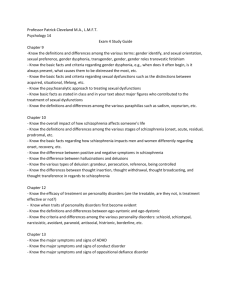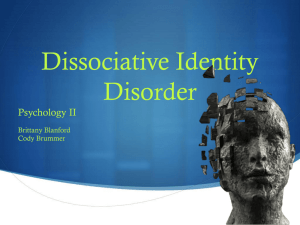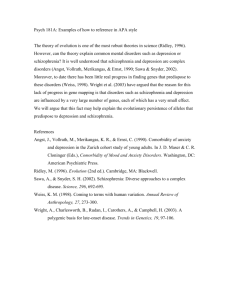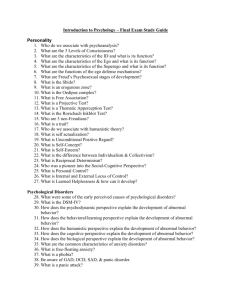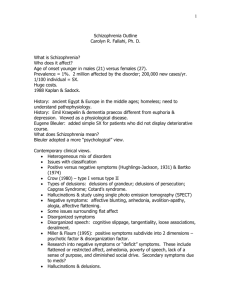Psychology
advertisement
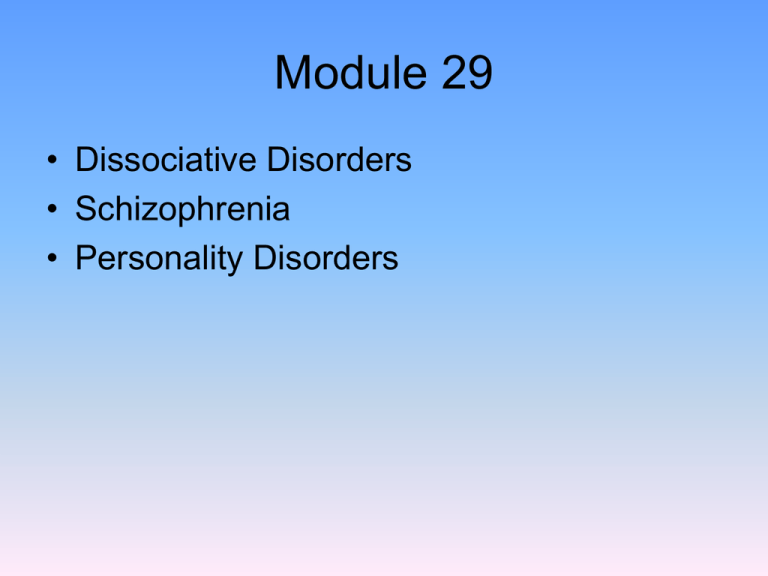
Module 29 • Dissociative Disorders • Schizophrenia • Personality Disorders Dissociative Disorders • Disorders in which the sense of self become separated (dissociated) from previous thoughts, memories or feelings Dissociative Amnesia • Characterized by the loss of memory in reaction to a traumatic event • Psychologists now think that this is what Freud mislabeled as repression (do not remember an event b/c it is too emotionally painful – like child sexual abuse) Dissociative Fugue • Characterized by loss of identity and travel to a new location • Time- hours, days, weeks , months, years • Caused by extreme stress Dissociative Identity Disorder • Rare and controversial dissociative disorder in which an individual experiences two or more distinct and alternate personalities • Used to be called multiple personalities Module 29: Dissociative, Schizophrenia, and Personality Disorders Schizophrenia Disorders Schizophrenia • A group of severe disorders characterized by disorganized and delusional thinking, disturbed perceptions, and inappropriate emotions and actions • Is not one disorder but a family of disorders • Is not “split personality” • Occurs in about 1% of the population Module 29: Dissociative, Schizophrenia, and Personality Disorders Schizophrenia Disorders: Symptoms of Schizophrenia Symptoms of Schizophrenia • Symptoms of schizophrenia include: – Delusions (false beliefs) – Hallucinations (false perceptions) – Inappropriate emotions or behaviors Delusions • False beliefs of schizophrenia and other serious psychological disorders • Four major types of delusions: – Grandeur – Persecution – Sin or guilt – Influence Delusions of Grandeur • False beliefs that a person is more important than they really are • Patients may believe they are a famous person (e.g. Napoleon, Jesus) Delusions of Persecution • False beliefs that people are “out to get” the person • Believe they are being followed, the phone is wiretapped, being followed, etc. Delusions of Sin or Guilt • False beliefs that the person is responsible for some misfortune • Ex. I didn’t do the crossword puzzle today and it caused a plane to crash. Delusions of Influence • False beliefs of being controlled by outside forces • “Devil made me do it.” Hallucinations • False perceptions of schizophrenia or other serious psychological disorders • Types of hallucinations: – * Auditory (hearing voices) – Visual (seeing things) – Tactile (feeling skin sensations) • Can also have distorted smell and taste Inappropriate Emotions/Behaviors • Flat affect – showing little or no emotional response • Emotional opposite - laugh at a funeral • Word salad – nonsense talk • Waxy flexibility – the person’s arms and legs will remain in place after being moved there Module 29: Dissociative, Schizophrenia, and Personality Disorders Schizophrenia Disorders: Types of Schizophrenia Paranoid Schizophrenia • Characterized by delusions, especially grandeur and persecution. Auditory and other hallucinations support the delusions. Catatonic Schizophrenia • Characterized by variations in voluntary movement • Catatonic excitement – rapid movements with delusions and hallucinations • Catatonic stupor – little or no activity, movement, or speech (waxy flexibility) Disorganized Schizophrenia • Characterized by bizarre behavior, delusions, and hallucinations. • Very disturbed thought and language (word salad) Undifferentiated Schizophrenia • Symptoms that don’t clearly fit into one of the other types of schizophrenia but still show clear symptoms of schizophrenia Module 29: Dissociative, Schizophrenia, and Personality Disorders Schizophrenia Disorders: Causes Biological Factors - Genetics • Schizophrenia tends to run in families. • Genetics appears to produce a predisposition (increased likelihood) to develop schizophrenia. Biological Factors – Brain Structure • Brain structure of those with schizophrenia is different than the normal brain • Those with schizophrenia have smaller amounts of brain tissue and larger fluid filled spaces. • The thalamus is smaller in those with schizophrenia. Biological Factors – Brain Function • The brain of those with schizophrenia operates differently than the normal brain. • The frontal lobes show less activity. • Those with schizophrenia have a larger number of receptor sites for the neurotransmitter dopamine. Biological Factors – Prenatal Viruses • A viral infection during the middle of pregnancy may increase schizophrenia risk. Psychological Factors • Two main areas: – Stress – Disturbed family – It’s unclear whether these are causes or consequences of schizophrenia. Personality disorders • Characterized by inflexible and lasting behavior patterns that disrupt social functioning Related to anxiety • Avoidant personality disorder – afraid of being rejected in a social relationship – therefore, thed to avoid them • Dependent personality disorder – clinging, needed, submissive Related to odd / eccentric behaviors • Paranoid personality disorder – deep mistrust of others – problem with relationships • Schizoid personality disorder – detached from social relationships – “loner” – a hermit Personality disorders with dramatic or impulsive behaviors • Borderline personality disorder- unstable emotions, self-image, behavior and relationships • Antisocial personality disorder (sociopath)usually a man, shows a lack of conscience for wrongdoing and lack of respect for rights of others (Scott Peterson) – Murders – No remorse – Usually clever and charming
